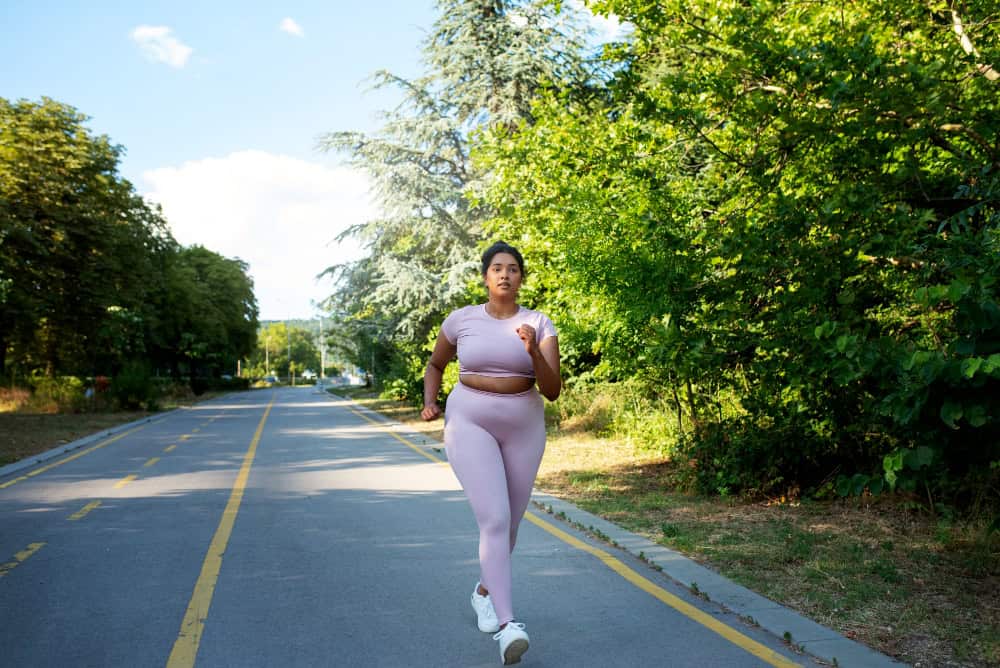
The last few months of the year come with festive feasts, busy schedules, and yes, a silent wish to feel lighter and healthier before the calendar resets. If you have been promising yourself that this year you will finally hit the goal weight, now is the perfect time to act. The truth is, lasting weight loss is not about crash diets and extreme routines that rarely work long-term—instead, with the right approach, sustainable strategies, and a proper diet plan for weight loss, you can help yourself shed pounds while keeping your health intact.
Here are 7 expert-backed weight loss tips that can bring you closer to your goal weight in a realistic and safe way.
1. Start With Light And Realistic Goals

One of the most common mistakes that people make is setting goals that are too high and too much. Aiming to lose 10 kilos in a month is not just unrealistic but also unhealthy. Instead, aim for three 15-minute walks per week [1]. This rate is safe, sustainable, and can reduce the chances of gaining it all back later. Break down your larger goal into smaller weekly milestones.
Tip: Don’t just aim to “lose weight”; know why you want it. Maybe it’s to boost energy, feel confident in your clothes, or have better mobility. Connecting your goal to a meaningful reason helps you to stay motivated.
2. Practice Portion Control Without Feeling Deprived

Overeating – even healthy food – can reverse the process. That’s why portion control is important. You don’t have to measure every bite, but simple strategies can help:
– Use a smaller plate
– Fill half of your plate with vegetables, one quarter with protein, and one quarter with whole grains.
– Eat slowly; it takes about 20 minutes for your brain to register fullness [2].
– Allow occasional treats – no food guilt, just try to maintain a balance and get back on track as soon as possible.
Remember, it is not about eating less and starving yourself; it is about eating smartly and more mindfully.
3. Prioritize Movements That You Enjoy

Exercise is not just about burning calories; it’s about building habits you can stick to. If you fear every workout, you are less likely to stay consistent. Instead of forcing yourself into routines you dislike, choose activities that you actually enjoy. Love dancing? Try Zumba or a dance-based workout. Prefer quiet time? Go for yoga or Pilates, whatever suits you more. Like the outdoors? Brisk walking, jogging, or cycling may be perfect.
Simple weight loss tips for an adult are to aim for at least 150 minutes of moderate-intensity exercise per week, along with 2 days of strength training sessions per week. Strength training is particularly important – it builds lean muscle, which increases your metabolism even at rest.
Keep your fitness journey on track with home exercise equipment.
4. Keep Track In A Food Diary

Writing everything down about what you eat – from meals to snacks and beverages – helps you become more mindful of your choices and portion sizes. This may help you in your food intake and make you more aware of what your total calorie intake is, making your decisions healthier and more accountable. Use a notebook, an app, or even your phone’s notes to log what you eat, when, and how you feel. This can also help you identify patterns, like late-night snacking or emotional eating, so you can adjust and stay on track towards your weight loss goals.
Proper guidance and support can help you with good weight loss tips in the long run.
5. Stay Hydrated – Sometimes Thirst Feels Like Hunger

Many people mistake thirst for hunger and end up snacking unnecessarily. Drinking enough water not only prevents this but can also help in better digestion and boost metabolism. Start your day with a glass of water and carry a refillable bottle to sip throughout the day. Replace or avoid sugary drinks like sodas or juices with water, or if you don’t like just water, then you can also go for lemon water or herbal teas that are preferably fresh and natural.
6. Focus on Nutrient-Dense Foods, Not Just On Calories

While a calorie-deficient meal is necessary for weight loss, the quality of calories also matters. Replacing your meals with processed diet snacks or sugary beverages won’t do much good. Instead, build diet plans for weight loss that are rich in:
– Proteins: Lean meats, fish, tofu, eggs, and legumes (can keep you full longer)
– Fibers: Vegetables, fruits, whole grains (can aid digestion and curb hunger)
– Healthy fats: Nuts, seeds, avocado, olive oil (can help support metabolism and heart health)
7. Be Consistent; Don’t Obsess on Being Perfect

This might be the most basic but important tip to follow non-negotiably. Weight loss is not about being perfect every day – it’s about being regular, consistent, and never giving up on yourself most of the time. Skipping a single workout or indulging in a small piece of cake does not mean that you failed or that you were not serious about your weight loss journey. What matters is getting back on the track, the next meal, or the next day, or as soon as possible. Long-term habits always outweigh short-term perfection.
Remember
Reaching your goal weight before the year ends is not when you starve yourself or work out like a machine endlessly. It is about making small but sustainable changes and sticking with them consistently. These 7 weight loss tips can set you up for success. Weight loss is not just about the number on the weighing scale; it is about feeling healthier, stronger, and more confident in your own skin. So, start today, make steady progress, and by the end of the year, you will be proud of yourself for how far you have come.
(The article is written by Sneha Jajoo, Intern, Clinical Health & Content, and is reviewed by Monalisa Deka, Senior Health Content Editor)
Recommended Reads:
5 Top Protein Options for Weight Loss
FAQs About Weight Loss
Q. What is the best way to lose weight?
The best way to lose weight is a combination of balanced nutrition, regular physical activity, and consistency. Instead of extreme diets, focus on sustainable habits like portion control, strength training, and mindful eating.
Q. Does drinking water help lose weight?
Yes, drinking enough water reduces hunger by promoting fullness and prevents mistaking thirst for hunger. Replacing sugary drinks with water also cuts unnecessary calories.
Q. How many calories are in 1 kg?
One kilogram of body fat contains approximately 7,700 calories.
Q. Do you burn fat when you don’t eat?
Yes, your body burns stored fat for energy when you have eaten foods that contain glucose, but this process is called ketosis and can be dangerous if sustained after a limited time without proper guidance.
References
1. Maintaining a Healthy Weight
https://www.nia.nih.gov/health/healthy-eating-nutrition-and-diet/maintaining-healthy-weight
2. Blackburn CD& KB. What happens when you overeat? MD Anderson Cancer Center. https://www.mdanderson.org/cancerwise/what-happens-when-you-overeat.h00-159775656.html.